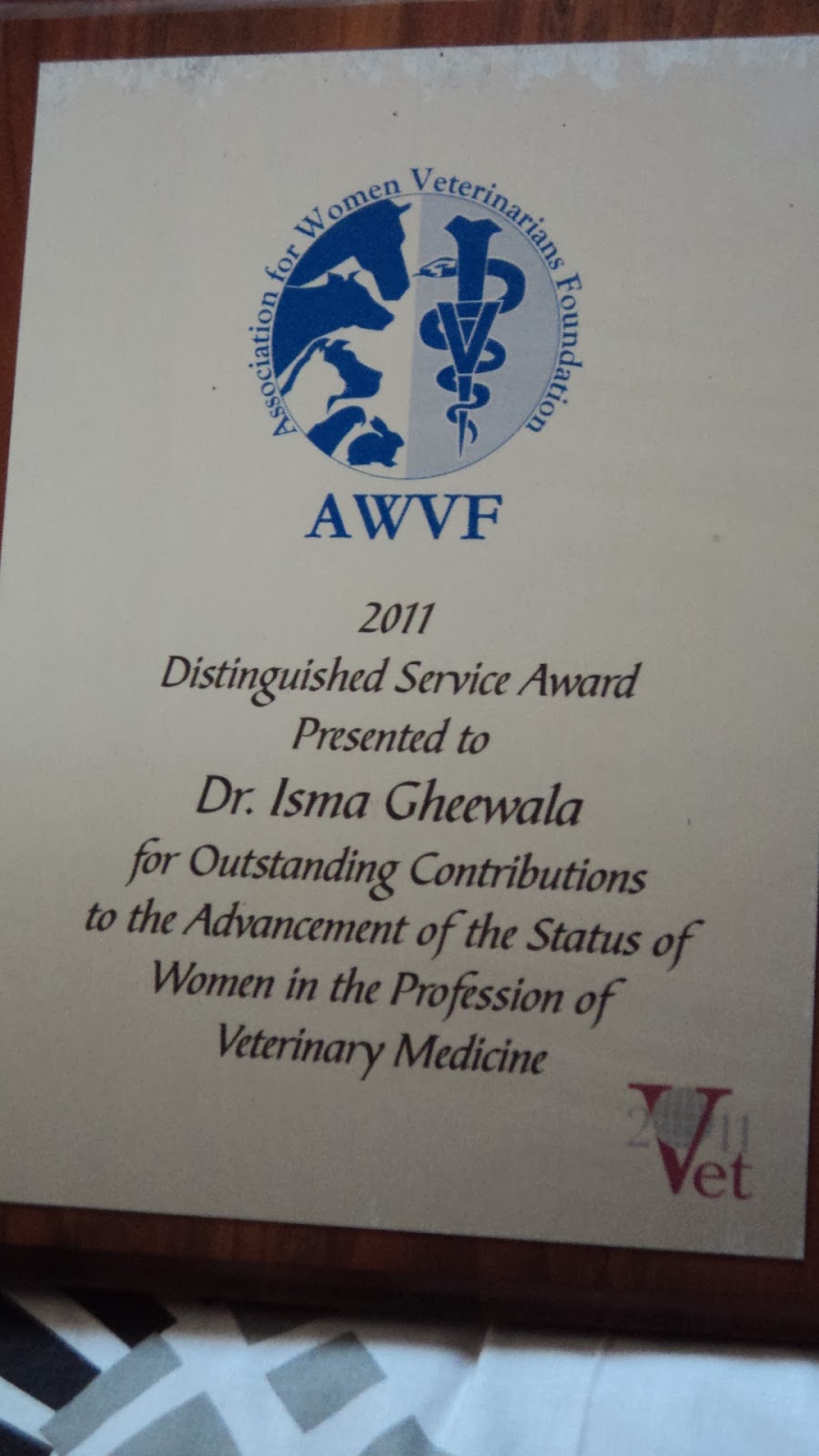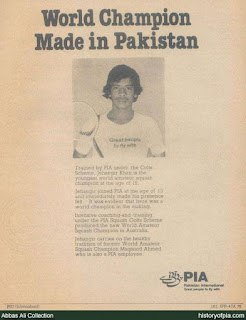Women Rising - TRAIL BLAZING DR. ISMA CLAIMS DISTINGUISHED SERVICE AWARD
Interviewed by Adil Ahmad, and published in TCS CONNECT Corporate News Magazine,
January 2014 Volume 13 Issue 1
Much before the advent of Malala Yusufzai, the Land of the
Indus and the Karakorum had been blessed with its share of warrior princesses
soldiering on in a hostile, male dominated landscape, and through their sheer
dint of hard work and perseverance creating much coveted space for themselves
in a conservative society, and in some cases being recognized and celebrated at
international forums.
Isma Gheewala, born Isma Aitzazuddin, is in the forefront of
women’s emancipation in Pakistan ,
and has been so for the last three decades and more. She’s a veterinary doctor,
a surgeon. In 2011 the USA
based Association for Women Veterinarians Foundation (AWVF) picked Isma from a
star studded international field of candidates for the Distinguished Service
Award. The Awards Committee included the leading lights of the profession Dr.
Judy Spurling of Parker, Colorado ; Dr. Debra
Nickelson of Phoenix , Arizona ;
Dr. Kathy Eanest-Koons of Ithaca , New York ; and Dr.
Chris Stone Payne (Awards Chair) of Union
City , California
DEFYING PREJUDICE
Hailing from an old established family of Lahore , Isma has bucked the system and defied
tradition to make her mark in a male dominated field, supported in her endeavor
by enlightened parents and husband, a rarity in Pakistani society. The daughter
of accomplished polo player, teacher and great lover of animals the late Fakir
Syed Aitzazuddin (Jaja Mian), Isma turned her back on many a lucrative
education option, choosing instead a field which 20 years ago was looked down
upon as producing ‘cattle doctors’.
In 1987 Isma was awarded ‘Doctor of Veterinary Medicine’ from
the College of Veterinary
Sciences in Lahore ,
affiliated with the Agricultural University Faisalabad. In 1991 she did her
Masters in Veterinary Medicine & Surgery. Her decision to make her mark
operating and running her own clinic as opposed to working for pharmaceutical
companies or the government was in sharp contrast with the norm.
In her choice of career Isma faced opposition from family
members and friends who thought that being a Vet was a degrading profession,
especially for a lady, especially when the lady in question could get into any
medical college of the country. To appease her family Isma went to visit a
government hospital to see doctors at work. The conditions she witnessed there,
coupled with the attitude of the doctors, shocked her into thinking that the
doctors had lost their humanity. That made up her mind and Isma decided to
become a Vet, to do something useful for the animals the love for whom she had
inherited from her father, and at the same time retain her humanity.
While studying for her degree any free time that she had was
spent working in the dog ward of the college, and the surgery department,
gaining experience. The rest of the girls in Isma’s class, 2 foreign students
and 3 Pakistanis, wondered why she could not settle for a laboratory job.
COPING WITH MAIDS, DRIVERS, COOKS & FRISKY YOUTH!
Eventually, after completing her studies Isma started her
practice in a small one room clinic in her father’s house, seeing a few
patients each day. Then she got the break she was looking for when in 1999 her
mother agreed to bankroll her ambitions to invest in a place of her own and
start a proper clinic. The Small Animals Hospital
came into being on 26th
Street in Karachi ’s
Defence Housing Authority. It was the first clinic to be owned and run by a
woman Vet in Pakistan .
Initially it was difficult, she says, as people here tend to send their animals
to the clinic with their maids, drivers, or cooks. These people seeing a woman,
would sometimes tend to misbehave, but soon got the message that either they
behave or take their animals elsewhere. Young boys seeing a girl tending to
their animals would try to take liberties, and make jokes, but Isma was very
strict, and thought to herself that if she respected her profession the people
would eventually respect her too. She never gave up and always tried her best
with all her clients.
It has taken Isma 15 years to finally achieve what she
intended to, and in so doing she has paved the way for a younger generation of
lady Vets to stand on their own. Isma’s practice has now become a referral
clinic for the entire country. Most of the animal owners across the country
know and respect her name. She is consultant for the Karachi Zoo, the Police
Canine Unit, the Police Mounted Unit, the Rangers Dog Unit, and scores of
private owners of dogs and horses. Isma is also a member of WASAVA and has for
the last few years started attending conferences abroad to better improve her
knowledge base.
RIDING OFF THE BEATEN PATH
I have had the privilege and pleasure of knowing Isma since
the early 1980s when I attended the Shahsawar
Riding School
Very recently Isma has shifted her clinic’s coordinates, and
moved from 26th Street
to the corner of Khayaban-e-Nishat and Khayaban-e-Bukhari. It’s a much bigger
place featuring two operation theatres for minor and major surgeries, and
examination room, grooming facility, and boarding and lodging for 35 cats and
dogs in the Basement serviced by a life. Ali Habib (Indus Motors) and his
family have contributed to the new setup with a lot of equipment that includes
an anesthesia machine. “So far I have been performing soft tissue surgeries
involving skin and muscle, as well as setting broken bones,” says Isma. “Now
with anesthesia machine chest surgeries will also be possible.”
Surprisingly Isma dreads treating reptiles, and says that
Vet school never taught reptile disorders. Though she once did take an
ultrasound of an albino python to detect the presence of eggs. She is, however,
able to treat turtles and tortoises, though the bulk of her clientele comprise
dog and cat owners. She says skin disorders are the most common, followed by
fever in both canines and felines, as well as stomach ailments, chest
infections, and hear and liver problems.
I am sure there are many women veterinarians around the
world with volumes to their credit and entirely deserving of the Distinguished
Service Award. What made Isma stand out and claim the Award was the fact that
she has persevered with skill and determination in a hostile and male
chauvinistic environment, demonstrating high levels of competence and
professional integrity, and coping with resource scarcity, the bane of
developing countries. Not withstanding, the fact that 15 years later her clinic
today is a flourishing concern, and she a greatly respected and admired member
of society, is enough testimony to her success.
Bravo Isma!
Dr. Isma Gheewala can be reached at ismagheewala@gmail.com





FS Aijazuddin’s book launched
ReplyDeleteTHE DAWN NEWSPAPER'S STAFF REPORTER
Published 2014-01-30 07:32:48
LAHORE: Fakir S Aijazuddin, a scion of the Fakir family, on Wednesday launched his book ‘The Resourceful Fakirs – three Muslim brothers at the Sikh court of Lahore’ -- documenting his family history and its role in the reign of Maharaja Ranjeet Singh.
In a 40-minute monologue, FS Aijazuddin briefly described how his three ancestors – Azizuddin, Imamuddin and Nuruddin – exerted influence on the Mahajara and were able to carve out, for the first time, identity of Punjab in 5,000-year history of India.
How Azizuddin – a gifted linguist, scribe and hakim – was able to play a vital role in the Sikh kingdom by securing the Treaty of Amritsar in 1809 in which the British recognised Ranjit Singh’s independent status as a raja and later the Tripartite Treaty of 1838, under which the Crown and the raja forged an alliance as equal partners.
Fakir Azizuddin served as the Maharaja’s indispensable spokesman and a trusted negotiator in all the dealings he had with the neighbours surrounding his expanding kingdom, including the increasingly powerful British. It was a tribute to Azizuddin’s skill that throughout the 30 years of their association, he enjoyed the unalloyed confidence of the canny Maharaja.
Fakir Imamuddin held the keys to Govindgarh Fort (near Amritsar) where the fabled Sikh treasury and armoury were located. The youngest -- Fakir Nuruddin -- occupied a position of prominence at the court and after Ranjit Singh’s death in 1839, acted as a member of the Regency Council.
Explaining the content of his book, he also threw light on how subsequent intrigues affected the kingdom and how Fakirs were still able to maintain their “independent and dignified” stance on different issues facing the kingdom after Maharaja’s death.
The book is published by an Indian publisher but is now available in Pakistan as well. His family elders were there to praise him for brining together what was available in bits and pieces and project the family history “in its true colours”.
Awesome post...
ReplyDeletehttps://www.localvet.com.au/vet2pet/
Nurse salaries in the USA vary significantly based on multiple factors, including geographic location, nursing specialty, years of experience, and level of education. Generally, registered nurses can expect to earn between $60,000 and $90,000 annually. In high-demand urban areas, salaries often trend toward the upper end of this range, while rural settings may offer incentives to attract talent. Advanced practice registered nurses, such as nurse practitioners, typically earn higher salaries, frequently exceeding $120,000 depending on their specialty. Benefits packages, which commonly include health insurance and retirement plans, further enhance overall compensation. Continuous professional development and specialization can also increase earning potential. As the healthcare sector continues to evolve, the outlook for nursing salaries remains robust, ensuring nurses can achieve financial stability. Overall, nursing is regarded as a well-paying profession in a growing job market.
ReplyDeletehttps://www.dynamichealthstaff.com/nurse-salary-in-usa
House Removals Edinburgh delivers exceptional moving services tailored for seamless transitions. Their expert team meticulously handles every aspect of the move, from precise packing to secure transportation and careful unpacking of all items. Equipped with a fleet of modern vehicles, they manage relocations of all sizes with unmatched reliability and efficiency. Emphasizing customer satisfaction, they offer flexible scheduling options to suit diverse needs. Transparent pricing ensures clients benefit from high-quality service without hidden charges. Known for their professionalism and keen attention to detail, they ensure every move is stress-free. For both local and long-distance relocations, they stand out as a dependable partner. House Removals Edinburgh is the go-to choice for a smooth and efficient moving experience.
ReplyDeletehttps://eh1-edinburghremovals.co.uk/house-removals-in-edinburgh/